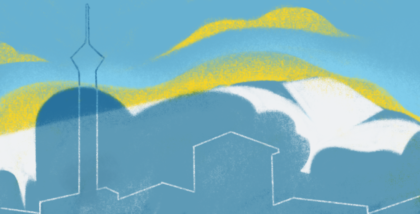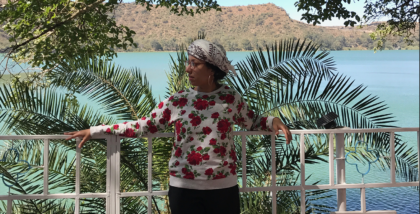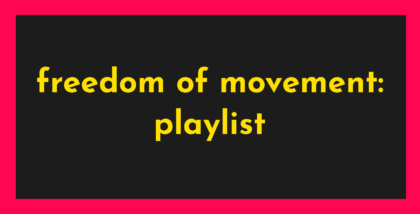Adi’s second issue, Freedom of Movement, arrives amid ricocheting rage, in Iraq, Chile, Bolivia, Hong Kong, Lebanon, Iran, Colombia, and beyond. While distinct in their tactics and aims, the protests unfolding across the globe share grievances—inequality, corruption, political oppression—that wrestle with this issue’s fundamental question: what does it mean to be free?
Freedom is a slippery concept, as much a political buzzword as it is a righteous objective, as susceptible to cooptation as it is central to the human spirit. This edition of Adi, which features pieces about each country on the Trump administration’s travel ban list, is an invitation to interrogate freedom, and to consider how foreign policy, state power, and the narratives we construct in media and public discourse intersect and delineate who gets to speak, to move, to contest, to dream.
Marcell Shehwaro narrates the many forms of silencing in the Syrian revolution, from childhood maxims to state brutality to erasure by international interveners. Yemeni journalist Afrah Nasser reflects on covering catastrophe in exile and the risks and responsibilities associated with telling the story of her homeland. And in Iran, Habibe Jafarian observes how young people are forging new ways of being in light of past and present revolutions and the vicissitudes of foreign policy.
Nadifa Mohamed, who left Somaliland for the UK as a child, contemplates the uneasy tensions between freedom and security in a traumatized nation. Suzy Kim probes the impact of banned goods on everyday life in North Korea, revealing how the oft-forgotten US involvement in the Korean War reverberates on the peninsula today. And Sujatha Fernandes critiques the stunted gaze of the media on Venezuela, illuminating a grassroots resistance that belies the notion of a vanquished socialism.
In a newly translated short story, Libyan writer Najwa Bin Shatwan concocts a satirical tale of a lion in Benghazi attempting to flee bombardment. And finally, Shailja Patel, a poet in exile from Kenya, reminds us how—always—personal and political freedoms are intimately entwined:
She shows me what hands become, when they release fear and greed. She shows me what hands can do when they channel knowledge with no barrier. Her hands? Are what it looks like to live without hesitation, without withholding.
—Meara Sharma, editor-in-chief
In this Issue

The Price of a Voice
Inside Syria, political voices emerged from repression. Outside, they resist appropriation.

Land of the Oldest Travel Ban
Among the items banned from entering North Korea: stethoscopes, syringes, solar panels, staplers.

A Kind of War
Iran’s young people are used to overcoming barriers to freedom. But there’s always a price to pay.

In Somaliland, the Horizon was the Mutable Limit
What does individual choice matter to a country that still holds the smoldering embers that could spark another conflict?

Against the Drums of Death
In Venezuela, listening to the pulse of grassroots resistance belying the notion of a vanquished socialism.


Where Are You Running To This Evening?
The lion’s great-grandfather hadn’t bombarded our brains with roaring claims of his absolute rule of Libya, the way every kind of Libyan is doing these days.

What Her Hands Do
I will never forget how her hands cut melody lines out of air, sharp and precise as a tailor turned sword-warrior.

A Soundtrack To Issue 2
We asked each contributor to Adi’s winter issue to select a song that resonates with their piece. Enjoy these tunes as you make your way through Issue 2: Freedom of Movement!

















